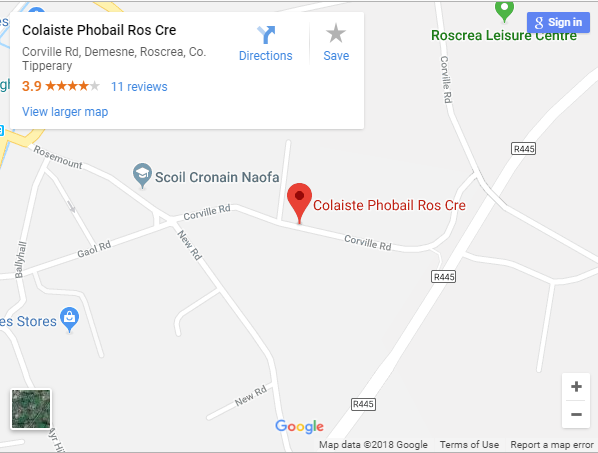Transition Year Trip to the Irish Aid Centre and to Leinster House
Reporters: Ally Clifford, Sarah Hayes, Leeanne Kavanagh, John Nolan and Libby Quinlan.
On Thursday the 1st December, we departed from Coláiste Phobal Ros Cré at 7.30a.m. We were accompanied by, Ms Leyne, Father Lorcan, Ms Mulrooney and Mr O’Connor. Our first stop was the Irish Aid Centre on Clonmel Street. When we arrived, we were greeted by Tess and Leo, 2 workshop leaders. We were shown a presentation about the Irish Aid Centre. The charity works with people in developing countries. We were shown an interview with a girl named Memory from Malawi. Memory was 18 in the video and was still attending primary school due to responsibilities at home. She dreamed of going to secondary school and becoming a nurse. After listening to Memory’s story we were separated into five families to play a game known as ‘Food Poverty’. The purpose of the game was to show us what life is like for those less fortunate in the world. We had to pretend we lived in a village in Malawi. Our leaders gave us different scenarios and questions. Depending on the questions and answers each family could lose or gain food. This game was very beneficial as it gave us an insight into what life is like for those less fortunate than us. The trip was very informative and beneficial.
After the Irish Aid Centre we walked to Grafton Street and to St Stephen’s Green Shopping Centre. The flickering lights and the carols being sung really got us into the Christmas spirit. After we had eaten we proceeded to walk to Leinster House. Alan Kelly T.D greeted us at Leinster House. Mr Kelly spoke to us about Dáil Éireann before we entered. We sat in the public viewing area of the Dáil and listened to a debate on homelessness and housing in Dublin. Then we were taken on a guided tour around Leinster House. We learned about its history, past Taoisigh, Countess Markievicz and her participation in ‘The Rising’. We then proceeded to the Seanad. We also saw the original proclamation and we received further information about its history.
Everyone agreed that it was a very informative and enjoyable trip.
Roscrea Junior Tidy Towns group raise awareness on Sustainable Waste and Resource Management in their community
Students in Coláiste Phobal Ros Cré who are active members of the Green Schools Committee and Roscrea Junior Tidy Towns carried out a Community Waste Minimisation Survey in recent months and have now analysed the results and suggest recommendations based on their findings. The purpose of the survey was to assess the levels of awareness and attitudes in households on topics such as recycling, composting, rainwater harvesting, energy usage in the home and types of transport used in everyday life. A door to door survey was distributed to households by students in their spare time and collected at a later date. Students generally looked after the housing estate or area they live in.
The tireless work of the students on environmental and community projects has been recognised both nationally and locally. The green schools committee raised their water flag this year and won the Green Schools Water School of the year 2016 for the Southern Region. The students recently accepted a Youth Development Award from Roscrea Enhancement Committee for their contribution to the landscaping and presence at the opening ceremony of the Roscrea Tidy Towns 1916 Community Garden of Remembrance.
The main findings of the households surveyed were as follows:
RECYCLING
- 85% of households took part in some form of recycling at home where the majority of recycled materials were paper, plastics, glass, tins and composting.
- 83% of respondents knew where their recycling centre is located, however 41% of the households surveyed said they do not use this facility.
- 50% of households engaged in some level of composting with fruit and vegetable peelings and used tea bags being the most common materials composted.
- 48% said they would try and buy products with less packaging.
- 78% of respondents agreed they could do more to reduce waste in the community.
ENERGY
- 48% of respondents said they fill the kettle for one cup of tea.
- 72% of respondents said they turn off the tap while brushing their teeth.
- 31% of respondents used the washing machine and dishwasher when only half full.
- 74% said they turn off lights when leaving a room.
- 59% said their hot water tank has a lagging jacket.
- 72% of respondents said they use energy saving light bulbs.
TRAVEL
- 48% of respondents said they use a car for short journeys of under one mile.
- 30% of respondents said they use public transport instead of their car.
The results from the survey revealed some interesting facts and it is the committee’s aim now to build on these findings by raising awareness of the benefits, both environmental and financial of taking small steps by changing our habits which will have a positive impact on our community. The green schools committee are now working on their fourth green flag on the travel theme and the results of this survey will be used to find ways of reducing our reliance on private car usage.
Suggestions from households surveyed included the need for “more public bins and bottle banks” and a “collection service by the recycling centre for people unable to get to local recycling facilities”. Other comments included the need to “build strong community links between schools, tidy towns committees and local organisations to promote recycling, conservation and biodiversity in our environment.”
Social media is used to raise awareness among the community through the school twitter account and Tidy Towns facebook page with weekly tips on how to reduce waste and develop greener habits.
As we enter the Christmas season the following tips will help reduce waste over Christmas:
- Make a list when shopping and only buy what you need.
- Bring re-usable bags when shopping; they’re not just for groceries.
- Buy rechargeable batteries.
- Buy a Christmas tree in a pot you can later plant out.
- Compost the fruit and vegetable peelings used in preparing meals.
- When buying electrical goods, bring the old goods to the retailer.
The national Tidy Towns Competition 2016 Adjudication Report acknowledged the great strides of Junior Tidy Towns and Green Schools in developing ways to protect and enhance their local environment. We hope to build on this work in the months ahead, especially in the areas of sustainable waste and resource management.




